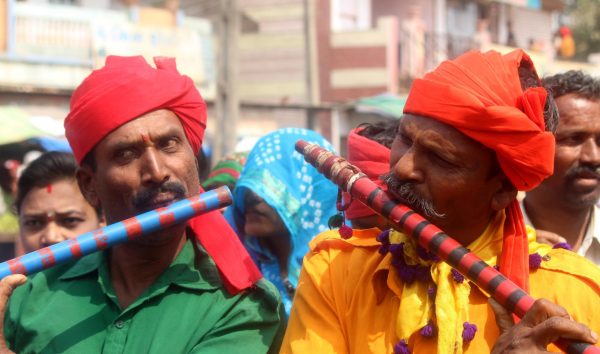African Students Association Holds Annual Banquet to Provide Scholarships and Funding for International Students
Last Sunday, the African Students Association held its annual banquet in the Root Room of Carnegie Building. There was a live DJ, catered food from Ethiopian and Nigerian restaurants in Cleveland and North Olmsted and lots of dancing. Midway through the event, the DJ put on a series of songs from countries across Africa, and students from the countries represented held flags on the dance floor for the Parade of Nations. The event was widely attended by ASA members, College professors and deans, and identity-based student organizations across campus, and provided the opportunity for students from Africa to celebrate their home countries while helping ASA to raise money for the Yakubu Saaka Memorial Fund that supports African students at Oberlin.
The Yakubu Saaka Memorial Fund was established in memory of Dr. Yakubu Saaka, professor of Africana Studies from 1972 2008, and exists to provide transitional and scholarship aid for African students. The Oberlin website reads, “For several generations of Oberlin students, [Dr. Saaka’s] courses on African politics and cosmology were staples in understanding African culture andtradition.” ASA was inhibited in their ability to fundraise during the COVID-19 pandemic, so this year’s fundraising efforts were expanded to both the banquet and ASA Performance Night at the Cat in the Cream, organized by College second-year and ASA co-chair Chemutai Ruto, with help from double-degree third-year Nathaniel Coben.
“Other than the banquet and the performance night, one of the other things that we have been focusing on, and this is in partnership with the Impact Investment Advisory Group … is this problem that myself and the other African students have noticed,” Ruto said.
As an Impact Investment Advisory Group Fellow, Ruto has been working with both the group and other African students to outline actionable steps toward improving the scarcity of Africana Studies courses on campus.
“We have a disproportionate amount of courses that focus on Africa on campus,” Ruto said. “And so we’ve been working with department heads, reaching out to them, trying to understand why that is the case across departments. Kambura [Kinoti] and I wrote an article about it [in] The Oberlin Review, and [last] semester I’ve just been doing more research on it, reaching out to the different department heads, and I’m supposed to present along with other African students on why this is a problem, and solutions we have for the College to put in place so we can just increase the courses.”
Ruto noted that both the ASA Performance Night and the banquet garnered significant attendance and support, with fundraising either meeting or surpassing estimated goals. She hopes the support of the Oberlin community for ASA’s organizational goals will be sustained beyond the banquet.
“I must say that I was actually really happy with the turnout,” Ruto said. “It can be reallynerve-wracking when you’re part of an organization or an identity group that’s so small on campus and our countries are so far from the U.S. … I think there’s just a lot of prejudice that we face … Sometimes you don’t really know if people will come for any of our events or support our causes because it may not affect them personally, or it’s just too distant for them to understand. … But we’ve had people support us; there’s been a lot of allyship and we hope to see that moving forward as we’re trying to increase the course offerings on Africa.”
College third-year and ASA member Lulu Chebaro echoed that the banquet’s support of the Yakubu Saaka Memorial Fund embodies ASA’s drive to support African students, both fiscally and through broader course offerings.
“Here at Oberlin, not only do we not have that many professors in the Africana [Studies] department that can teach on the African continent, but we also just don’t have that many students,” Chebaro said. “So a big thing in ASA right now is, first of all, they’ve been having meetings about trying to get more classes on the African continent, but also just trying to get more students here and make an environment where African students from the continent would actually want to come and feel like they have a community.”
Chebaro emphasized that the banquet required the collective efforts of the ASA community. Given that African students are an underrepresented group on campus, each member’s contributions proved indispensable in making the event happen.
“I think that kind of makes a community particularly strong — it’s very much like, if you do not help, we don’t even know if something would happen,” Chebaro said. “We don’t even know if there would be a community or a space at all. Especially also because there’s very few of us on campus. At the banquet, just being able to have a space where the dancing and the music and stuff are very particular to [the continent] … you don’t really get that at other larger orgs.”
College third-year and ASA co-chair Kambura Kinoti noted that although the process of securing funding and transportation for this year’s banquet required a lot of time and effort from the ASA board, the event was a huge success, even more than last year’s. Kinoti remarked that everyone — even professors and deans — could be seen letting loose on the dance floor. She particularly loved seeing the community between POC student organizations manifest in the banquet’s vibrant space.
“We always have all of the other POC orgs come, especially the ones that are for international students,” Kinoti said. “And so it’s always so cute because we always have a table for [the South Asian Students Association] and we have a [Muslim Students Association] table. … we always have all these different communities represented and we all have really good relationships. I think that’s something that I always look forward to and I love about the banquet.”










